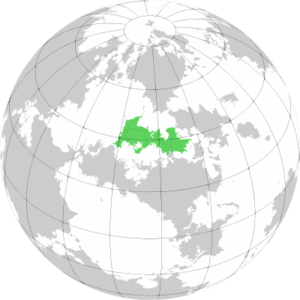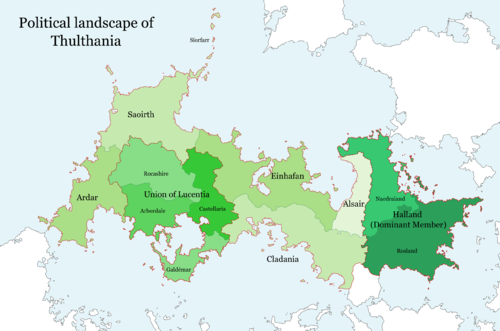Thultannian Union
Jump to navigation
Jump to search
| Thultannian Union Confederation of Thultannian States |
|||
| Logo | Flag | ||

|

| ||

| |||
| Member states shown in green | |||
| Members states and key leaders | |||
| |
Adelaide II Dominic I of Galdémar Macsen Rhydfelyn Tadhg Ó Riain Cedric IV Malo Dervennec Lilit III | ||
| Type | Intergovernmental and security partnership | ||
| Purpose | Customs and security union, political collective maritime | ||
| Regions | Thultannia | ||
| Founded | TBC | ||
| Other names | TBC | ||
The Thultannian Union is a customs and security union in Thultannia.
History
- Halland's involvement in the Wolgos Scourge aimed to protect the Crownlands and Bowersland but came at a high cost, resulting in significant loss of life. This led to the Lost Generation Crisis in Halland, where many Hallisian lives were lost without any tangible gains. To address the demographic gap caused by the war, Halland facilitated trade and migration treaties with Alsair (then a poor Anarian backwater) and the underdog Einhafan. Additionally, there was a significant influx of migrants from Altaia, D'runia, and the Kuvimbic Sea. These treaties also fostered economic cooperation and led to diminishing tariffs between Halland and the poorer Northern Thultannian nations.
- Lucentia's involvement in the Anisoran Civil War was motivated by a desire to undermine Anisoran hegemony over the Medio by aiding Cadrai's independence.
- Ardar and Cladania entered a state of belligerence against Anisora, aiming to blockade the Western Strait and control navigation through the Varanese Islands.
- This conflict led to the formation of the Wessian Accord in the early 7610s, a confederation between Lucentia, Ardar, and Cladania focusing on military cooperation, infrastructure development, and the elimination of tariffs.
- Halland's Succession Crisis began in 7641 after a series of unfortunate events involving King Carlin IX's sons, Crown Prince Edrin and Prince Timas. The brothers, rivals since childhood, engaged in public disputes and attempts to tarnish each other's reputations. The crisis reached a peak during the Eldermere Affair, a reconciliation dinner hosted by Crown Prince Edrin, which mysteriously ended with Prince Timas's sudden death.
- A significant portion of the public and nobility accused Edrin of murder, leading Parliament to pressure King Carlin IX to disinherit him in favor of Princess Seren. After King Carlin's death in 7643, the succession crisis deepened. Prince Edrin, backed by military factions loyal to him, claimed the disinheritance was illegal, as he had never been formally accused, investigated, or sentenced for Timas's death, asserting his right to the throne. However, Parliament proceeded with Queen Seren's coronation, prompting a military split and an attempted coup by Edrin's loyalists.
- The succession crisis also sparked wider unrest: Northern Naedraland republicans rose for regional autonomy and a republican government, while in Rossland, Orderist firebrands incited militias. In Northern Naedreland, Aedelish adventurers landed with the intent of establishing a new independent nation.
- The civil war in Halland in the late 7640s saw multiple factions—Orderists, Republicans, and Monarchists—clashing. Violence from Aedeland's civil war spilled into Hallis due to Stoldish sympathizers hosting Aedelish agitators in the north. The conflict concluded with a Monarchist victory after a pact with the Republicans against the Orderists and Aedelish "adventurers." With the monarchy surviving but with a much diminished influence over the government.
- Halland's prolonged civil war, lasting four years, weakened the nation significantly, resulting in the loss of most of its overseas holdings. All Arctic territories were lost to Arvor under peacekeeping missions, and other possessions like Edwin's Land, the Junction Islands, and Southern Bowersland were ceded to Sokoku. North Bowersland became independent, leaving only Yuma Island, Binkosa Island, and the Reach Coast Islands under Halland's control.
- The poverty in Northern Thultannia and the damage sustained by Halland during the civil war pushed further integration with the Wessian Accord nations. While the Wessian Accord nations saw little direct impact from Halland's succession crisis, they remained cautious of Anisora and feared a resurgence from Aedeland.
- The expansion of the Wessian Accord led to the formation of the Thultannian Union in 7655, creating a confederation with free internal trade, no tariffs, freedom of movement, judicial unity, and military coordination. Foreign affairs and internal fiscal policy remained under the full sovereignty of the member nations.
Members Of The Union
